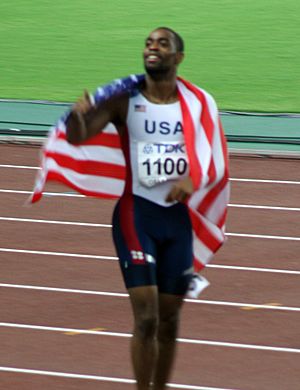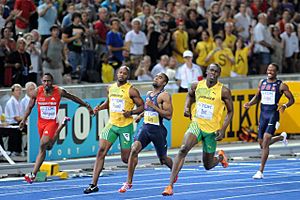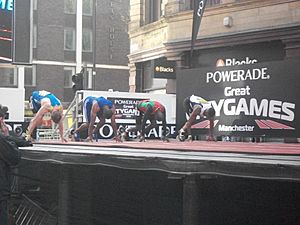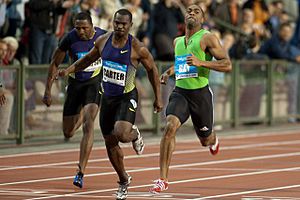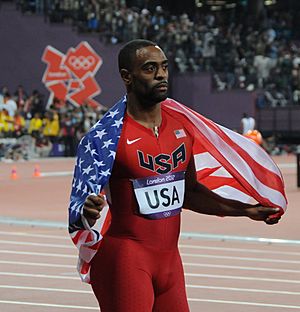Tyson Gay facts for kids
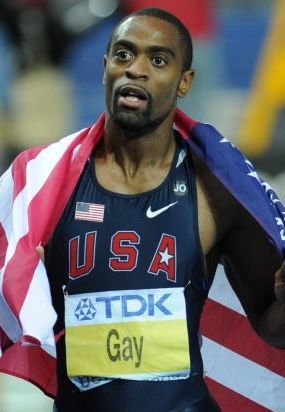
Gay at the 2009 World Championships
|
||||||||||||||||||||||||||||||||||||||||||||||||||||||||||||||||||||||||||||||||
| Personal information | ||||||||||||||||||||||||||||||||||||||||||||||||||||||||||||||||||||||||||||||||
|---|---|---|---|---|---|---|---|---|---|---|---|---|---|---|---|---|---|---|---|---|---|---|---|---|---|---|---|---|---|---|---|---|---|---|---|---|---|---|---|---|---|---|---|---|---|---|---|---|---|---|---|---|---|---|---|---|---|---|---|---|---|---|---|---|---|---|---|---|---|---|---|---|---|---|---|---|---|---|---|---|
| Born | August 9, 1982 Lexington, Kentucky, U.S. |
|||||||||||||||||||||||||||||||||||||||||||||||||||||||||||||||||||||||||||||||
| Alma mater | University of Arkansas | |||||||||||||||||||||||||||||||||||||||||||||||||||||||||||||||||||||||||||||||
| Height | 5 feet 11 inches (1.81 m) | |||||||||||||||||||||||||||||||||||||||||||||||||||||||||||||||||||||||||||||||
| Weight | 176 lb (80 kg) | |||||||||||||||||||||||||||||||||||||||||||||||||||||||||||||||||||||||||||||||
| Sport | ||||||||||||||||||||||||||||||||||||||||||||||||||||||||||||||||||||||||||||||||
| Country | ||||||||||||||||||||||||||||||||||||||||||||||||||||||||||||||||||||||||||||||||
| Sport | Track and field | |||||||||||||||||||||||||||||||||||||||||||||||||||||||||||||||||||||||||||||||
| Event(s) | 100 m, 200 m, 4 × 100 m relay | |||||||||||||||||||||||||||||||||||||||||||||||||||||||||||||||||||||||||||||||
| Coached by | John Smith | |||||||||||||||||||||||||||||||||||||||||||||||||||||||||||||||||||||||||||||||
| Achievements and titles | ||||||||||||||||||||||||||||||||||||||||||||||||||||||||||||||||||||||||||||||||
| Personal best(s) |
|
|||||||||||||||||||||||||||||||||||||||||||||||||||||||||||||||||||||||||||||||
|
Medal record
|
||||||||||||||||||||||||||||||||||||||||||||||||||||||||||||||||||||||||||||||||
Tyson Gay (born August 9, 1982) is a retired American track and field sprinter. He competed in the 100 and 200 meters races. His best time in the 100 m is 9.69 seconds. This is the American record. It also makes him tied for the second fastest athlete ever in the 100 m, along with Yohan Blake of Jamaica.
Gay has won many medals in big international competitions. He earned three gold medals at the 2007 Osaka World Championships. These were for the 100 m, 200 m, and 4 × 100 m relay. He was only the second man to win all three events at the same World Championships. Maurice Greene did it first, and Usain Bolt did it two years later. Gay has also been a four-time U.S. champion in the 100 m.
At the 2008 Olympic Trials, he ran a very fast 9.68 seconds in the 100 m. This time was helped by a strong wind. A few days later, he got a serious hamstring injury during the 200 m trials. Because of this, he did not win any medals at the Beijing Olympics. In the 2009 World Championships, he won the 100 m silver medal with a time of 9.71 seconds. This is the fastest time ever for a runner who did not win gold in the 100 m.
In 2013, Tyson Gay's silver medal from the 2012 Summer Olympics 4 × 100 m relay was removed due to a rule violation.
Gay has won the Jesse Owens Award twice. He was named the 2007 IAAF World Athlete of the Year. He also won Best Track and Field Athlete from Track & Field News in 2007. The ESPY Award honored him in 2008 and 2011. He has also achieved some of the best times in the 100 m and 200 m races each season.
Contents
Early Life and Family
Tyson Gay was born on August 9, 1982, in Lexington, Kentucky. He is the only son of Daisy Gay and Greg Mitchell. Running was a big part of his family. His grandmother ran for Eastern Kentucky University. His mother, Daisy, also competed when she was younger. Tyson's older sister, Tiffany, was a good sprinter in high school. Tyson and Tiffany were encouraged by their mother. They raced often, training hard at school and on the hills near their home. They had a strong rivalry, and Gay later said his sister's quick starts helped him improve.
Starting His Running Career
Tyson Gay was often slow to start his races. But he worked hard to get better. He broke the Lafayette High School stadium record for the 200 meters. His coach, Ken Northington, helped him with his running style and rhythm. By his last year of high school, he was a more confident athlete. He focused on the 100 meters, winning the state championship. He set a new record of 10.60 seconds.
Even so, his mother felt he was not trying his hardest. Gay also struggled with schoolwork. He did not get the grades needed for a top sports college. However, at the Kentucky High School State Championships in June 2001, he showed his talent. He won gold in the 100 m, setting a new personal best of 10.46 seconds. In the 200 m, he won silver with a new personal best of 21.23 seconds.
At a track event in 2001, Gay met coach Lance Brauman. The coach convinced him to go to Barton County Community College. There, Gay met Jamaican sprinter Veronica Campbell-Brown. They became good friends and training partners.
College Running Success
Moving to the college in Great Bend, Kansas, helped Gay improve even more. In 2002, his 100 m time dropped to 10.08 seconds. His 200 m time dropped to 20.21 seconds. These times were helped by wind. He also improved his official best times to 10.27 seconds in the 100 m and 20.88 seconds in the 200 m. He kept winning, taking the 100 m at the NJCAA National Championship. The next year, he won bronze in the 100 m and silver in the 200 m at the NJCAA event.
Injuries affected Gay for the rest of 2003. His coach, Brauman, moved to the University of Arkansas. Gay followed him there.
First Big College Races
Gay decided to study sociology and marketing at the university. This was his first chance to compete in NCAA events. In March, at the NCAA Men's Indoor Track and Field Championship, Gay finished fourth in the 60 meters. He was fifth in the 200 m. The NCAA Men's Outdoor Track and Field Championship in June was much better. Gay became Arkansas' first 100 m NCAA champion. He set a school record of 10.06 seconds. His efforts helped the Arkansas team win the NCAA Championship.
Gay's first US Olympic Trials in 2004 showed he was a rising star. He did not reach the final in either the 100 m or 200 m. But he made it to the semi-finals of the 100 m. He also set a 200 m personal best of 20.07 seconds in the qualifying rounds. A hamstring injury stopped him from running in the 200 m final. But he saw the trials as a chance to learn. He said, "I was really focused upon the team, had a great shot, but it was a learning experience—how to take care of my body." By the end of 2004, he was ranked the eighth fastest 100 m runner and fourth fastest 200 m sprinter in the U.S. He was younger than most of the runners ranked above him.
In his last year as an amateur, 2005, Gay started strong. He set a personal best and school record of 6.55 seconds in the 60 m. He helped his university team win another NCAA outdoor title. He set a new personal best of 19.93 seconds in the 200 m qualifiers. He finished third in the finals. His training partner, Wallace Spearmon, won first place. Their times were the second and third fastest 200 m times in the world that year. Gay and Spearmon also teamed up for the 4 × 100 m relay. With Michael Grant and Omar Brown, they won with a record time of 38.49 seconds for Arkansas. After the NCAA Championships in June 2005, Gay decided to become a professional athlete. He aimed to join the US 200 m team for the Helsinki World Championships.
Professional Running Career
First Professional Season
After becoming a professional, Gay entered the USA Outdoor Championships. He won silver in the 200 m with 20.06 seconds. He was chosen for the 200 m at the 2005 World Championships in Athletics in Helsinki. He finished fourth, behind three other Americans. This was the first time one country took the top four spots in that event. Gay was part of the 4 × 100 m relay team. But a bad baton exchange led to their disqualification. Later that month, Gay ran the 100 m. He set a season's best of 10.08 seconds at the Rieti Grand Prix.
He ended the 2005 season well. He won the gold medal in the 200 m at the World Athletics Final. This was his first big championship title. His time of 19.96 seconds was his second fastest that year. It was the fourth fastest of any sprinter that season. He beat all three American sprinters he had lost to in the World Championships. He was the first athlete to beat Justin Gatlin in the 200 m that season.
Becoming a Top Sprinter
In 2006, Gay became a top contender in the 100 m. He won the 2006 US Outdoor Champion title. He improved his 200 m personal best by more than two-tenths of a second. This happened at the IAAF Grand Prix in Lausanne. His time of 19.70 seconds was not enough to beat Xavier Carter. Carter ran the second fastest time ever with 19.63 seconds. Gay then improved in the 100 m. He won the Rethymno track meet and set a new personal best of 9.88 seconds.
Gay ran another 100 m race under 10 seconds at the Stockholm Grand Prix. He finished second to Asafa Powell with 9.97 seconds. He also broke Michael Johnson's British 200 m record. He won in London with 19.84 seconds. Gay kept getting better in the 100 m. He set a personal best of 9.84 seconds at the Zürich Golden League meet. But Powell equaled his own world record of 9.77 seconds.
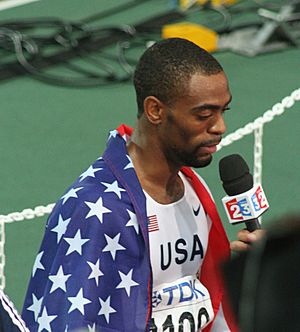
Gay's 200 m race at the 2006 IAAF World Athletics Final in Stuttgart was a great end to his year. He became the World Athletics Final champion. He set another personal best of 19.68 seconds. This made him tied for the third-fastest 200 m sprinter ever with Namibian Frankie Fredericks. Gay was happy Fredericks was there to see it. He said, "To run that time in front of Frankie is a privilege. He's someone I admire a great deal both as an athlete and as a man." Gay also won a bronze medal in the 100 m. He finished behind Powell and Scott. However, Gay proved himself in the 100 m at the 2006 IAAF World Cup. He won gold with a 9.88-second run. By the end of the season, Gay was a top runner. He had run six of the seven fastest 100 m times in the U.S. and four of the top six 200 m times. He was the second fastest 100 m runner in the world that year, only behind world record holder Powell.
Gay thought about his progress as a sprinter:
It's kind of hard for me to choose which one's my favorite. Some people say I'm a better 200 meter runner than a 100 runner. [But] you get that label as 'second-fastest man' or 'the fastest man in the world'. I think that's why I like the 100 more.
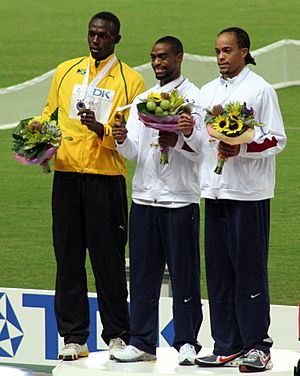
2007 World Championships Success
Gay started working with a new coach, Olympic gold medalist Jon Drummond. Drummond was known for his fast starts. Gay hoped he could help him improve his own starting times. Gay wanted to challenge World Record holder Powell in the 100 m. He said, "I want this to be a rivalry. I want to step up to the plate." His races showed his determination. He started the 2007 outdoor season with two fast runs. One was 9.79 seconds and the other 9.76 seconds. The 9.76 time was very close to Powell's record of 9.77 seconds.
At the US National Championships, he matched his 100 m best of 9.84 seconds. This was a meeting record. It was the second fastest 100 m time ever run against a headwind. He then set a new 200 m personal best in the finals, also against a headwind. His time of 19.62 seconds was the second fastest ever. Only Johnson's 19.32 seconds run in 1996 was faster. Gay was happy but knew the competition was still strong. He said, "I wasn't thinking about any time. I was trying to get away from Spearmon as fast as I could." After feeling tired, Gay rested for the 2007 World Championships in Osaka, Japan. He returned to Europe and won the 200 m in Lausanne with 19.78 seconds. He also won 100 m events in Sheffield and London. He was excited to race Powell at the World Championships. Both sprinters were undefeated that year.
The 100 m final in Osaka was a highly anticipated race. Gay won with a time of 9.85 seconds. He sprinted ahead of Derrick Atkins and third-placed Powell. He became the new 100 m world champion. Even though this was his first major 100 m title, he respected Powell. He said:
We have long looked forward to this duel. And I think somehow we are both winners. Asafa has run a strong race. He is the World record holder while I am the fastest this year and now I am the World champion...He has taken the bronze this time, but he could well come back with the gold next year in Beijing...I think for this year it makes me the fastest man in the world.
Gay won a second gold medal in the 200 m event. He ran a new championship record time of 19.76 seconds. He beat Usain Bolt and Spearmon. Bolt admitted he lost to the better athlete. He said, "I got beaten by the No. 1 man in the world. For the moment, he is unbeatable." Only Maurice Greene and Gatlin had won both sprint titles at the Championships before. But Gay wanted a third gold in the 4 × 100 m relay. The American team faced tough competition from Jamaica, which included Powell and Bolt. The Jamaicans set a national record. But it was not enough to beat the United States team. They finished in a world-leading time of 37.78 seconds. Gay won his third gold medal with Darvis Patton, Spearmon, and Leroy Dixon. This triple gold win was also achieved by Maurice Greene in 1999 and Carl Lewis in 1983 and 1987.
In November, Gay was chosen as the IAAF Male World Athlete of the Year for 2007. He thanked his rivals in his speech. He also said he needed to hold the World record like other great sprinters. At the end of the season, Gay was named 2007 Men's Athlete of the Year by Track and Field News. He was the fastest 100 m and 200 m sprinter that year. He also won the USATF's Harrison Dillard award as the top US male sprinter.
2008 Beijing Olympics Challenges
Gay started training for the Beijing Olympics. He returned to competition in May. He won the 200 m in Kingston. He took gold in both sprints at the Adidas Track Classic. He finished second in the 100 m at the Reebok Grand Prix with 9.85 seconds. However, Gay now faced a new challenge: Usain Bolt. At the Reebok Grand Prix, Bolt had beaten Gay with a world-record-setting 9.72 seconds. Gay realized he would need a world record time to beat Bolt and Powell at the Olympics. He aimed to run under 9.70 seconds.
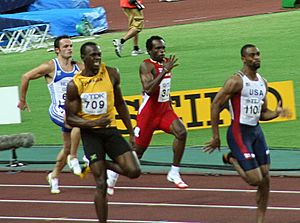
At the US Olympic Trials, Gay was a favorite for both the 100 m and 200 m. He ran a strong heat. He won the 100 m quarter-final with a US record of 9.77 seconds. This made him the third fastest 100 m sprinter ever, after Bolt and Powell. In the final, Gay finished first in a wind-aided 9.68 seconds. This was the fastest 100 m time ever under any conditions. The 200 m event was a big problem for Gay. He got a serious hamstring injury in the qualifiers. He could not compete in the event at the Olympics. The injury lasted for several weeks. He skipped other races to recover for the Olympics.
Gay returned to the track in Beijing. But his injury made his 100 m medal chances lower. Bolt and Powell were more likely to win. The expected final with Gay, Bolt, and Powell did not happen. Gay did not qualify in the semi-finals. He finished fifth with 10.05 seconds. Gay said he was not injured anymore. But he said the hamstring problem had affected his training.
More disappointment followed. The American 4 × 100 m relay team, with Gay as the last runner, did not qualify for the final. Darvis Patton and Gay failed to pass the baton. Gay took responsibility for it. But Patton said it was his job to pass the baton. Gay had wanted to win four Olympic gold medals earlier that year. But he finished the 2008 Olympics without any medals. He said, "[I felt the baton] then I went to grab it and there was nothing. It's kind of the way it's been happening to me this Olympics."
Gay finished the season in Europe. He won the 200 m at Gateshead. But he had to pull out of a race against Bolt and Powell because of his hamstring injury.
2009 World Silver and US Record
Gay returned to competition after the indoor season. He ran a new 400 m personal best of 45.57 seconds in May. In his first 200 m race of the season, at the Reebok Grand Prix, he set a personal best and meet record of 19.58 seconds. This was the third fastest 200 m run ever, after Bolt and Johnson's world record times. After a wind-aided 100 m run of 9.75 seconds at the US Championships, Gay said he could break the world record if he improved his technique. Record holder Bolt did not think so. He said it would be hard for Gay because "he is more of a 200 m runner." At the Golden Gala in July, Gay beat Asafa Powell's season's best with a 9.77-second run. This matched his own U.S. record. It was faster than Bolt's previous world-leading time of 9.86 seconds.
The first event at the 2009 World Championships in August was the 100 m. Gay reached the final, along with Jamaicans Bolt and Powell. He ran a new US record of 9.71 seconds in the race. This was the third-fastest time in history. But he still finished second. He lost his 100 m world title to Bolt. Bolt broke the world record with a run of 9.58 seconds. The 100m final made a groin/hip injury worse for Gay. He then pulled out of the 200m event to recover. He hoped to get better for the 4x100m relay, but decided to withdraw from that too.
At the Shanghai Golden Grand Prix, on September 20, 2009, Gay ran the second-fastest men's 100 m ever. He won in 9.69 seconds. This matched Usain Bolt's winning time at the Beijing Olympics in 2008. After beating Powell for the sixth time in Daegu, Gay said he would think about groin surgery. He said it was mostly about discomfort, not a serious injury.
2010 First Diamond League Win
At the start of the 2010 outdoor season, Gay ran a new 400 m best time of 44.89 seconds. This run improved his previous record by almost seven-tenths of a second. It made him the first sprinter ever to run under key time barriers in all three sprints. He ran under ten seconds for the 100 m, twenty seconds for the 200 m, and 45 seconds for the 400 m.
At the Great City Games in Manchester, England in May, he aimed to break Tommie Smith's 44-year-old world best mark over a 200 m straight. He beat Smith's time of 19.5 seconds. He finished in 19.41 seconds. This included a first 100 m of 9.88 seconds and a first 150 m of 14.41 seconds. He had hamstring problems after the run. But he returned to compete at the Prefontaine Classic in Eugene, Oregon, in July. This was his first meeting of the 2010 IAAF Diamond League. Running the 200 m, he finished in 19.76 seconds. But he was beaten by Walter Dix. A week later, he went to the British Grand Prix. Despite bad weather, he won against his rival Asafa Powell with a 9.93-second run. He set a meet record of 19.72 seconds at the Herculis meeting in Monaco later that month. But he was disappointed with his race. Yohan Blake almost caught him at the finish.
The 100 m at the DN Galan meeting in Stockholm was Gay's first race against Bolt that year. He surprised the Olympic and World champion with a big win. He beat Bolt with 9.84 seconds to Bolt's 9.97 seconds. This was only the second time Bolt had lost a 100 m final. Gay broke Powell's stadium record and won a diamond. Gay did not overstate the win. He knew Bolt was not at his best. He said, "It feels great to beat Usain but deep down inside I know he is not 100%. I look forward to beating him when he is." With Bolt and Powell both injured, Gay won easily at the London Grand Prix the next week. He ran a world-leading time of 9.78 seconds despite bad weather. A win at the Memorial van Damme in 9.79 seconds earned him the first Diamond Race Trophy for the 100 m.
2011 Injury and Return
He started his 2011 season with a 14.51-second run in the 150 m straight race at Manchester's Great City Games. This was just behind Bolt's 2009 run. His season's best 100 m run of 9.79 seconds came in June in Clermont, Florida. It was the third-fastest in the event that year. Gay was beaten by Steve Mullings at the adidas Grand Prix in New York. A hip injury caused Gay to withdraw from the 2011 USA Outdoor Track and Field Championships. In July, he had surgery. Almost a year passed before he competed again.
2012 Olympics and Disqualification
Gay showed he was ready for the 2012 Olympic Trials. He ran a low-key race at the adidas Grand Prix, finishing in ten seconds flat. Gay qualified for the 100 meters at the 2012 Summer Olympics. He finished second at the U.S. Olympic trials with a time of 9.86 seconds, behind Justin Gatlin. He won the 100 m at both the Paris and London legs of the 2012 Diamond League before the Olympics. This showed he was back in shape.
The 2012 Olympic 100 m final was the fastest Olympic race ever. Seven men ran under ten seconds. Bolt won in 9.63 seconds, followed by Yohan Blake. Gay ran 9.80 seconds. He missed a bronze medal by just one-hundredth of a second to Justin Gatlin. Gay was very upset about not getting an Olympic medal. He cried in the interview after the race. He said, "I felt like I ran with the field and I just came up short."
The 4 × 100 m relay final brought Gay his first Olympic medal. The team set an American record of 37.04 seconds. His teammates were Trell Kimmons, Gatlin, and Ryan Bailey. They equaled the previous world-record mark. But the Americans took the silver medal behind Jamaica, who broke that record. However, Gay was later disqualified from this medal due to a rule violation. This also meant the rest of the relay team lost their medals.
Later Career and Retirement
Tyson returned to racing after his disqualification. He won the 100 m at the Prefontaine Classic in 2015. The USA Relays team qualified for the World and Olympic games at the World Relays in Bahamas. They won the 4 × 100 m relay.
In the 2015 World Athletics Championships, Gay raced against Usain Bolt. He finished 6th in the 100 m final. Bolt, Justin Gatlin, Trayvon Bromell, Andre de Grasse, and Mike Rodgers finished ahead of him.
In the 2016 Summer Olympics, Gay ran the third leg for the USA 4 × 100 m relay team. The team included Justin Gatlin, Mike Rodgers, Trayvon Bromell, and Gay. The team finished third. But the American team was disqualified due to a rule violation during the baton exchange. This meant Gay did not win a medal at the Olympics. The Canadian team was then awarded the bronze medal.
In September 2016, it was announced that Gay would try to join the U.S. bobsleigh team. He planned to compete at the National Push Championships. However, he later withdrew from the competition.
Personal Life
Tyson Gay lives in Clermont, near Orlando, Florida. He has a daughter named Trinity. He is a religious man and attends St. John Missionary Baptist Church when he is home. He believes in his "God-given ability" to do great things.
Achievements
Gay holds the US record in the 100 m with 9.69 seconds. This makes him tied for the second fastest sprinter ever, along with Yohan Blake, after Usain Bolt. His 19.58 seconds makes him the tenth fastest 200 m runner in history. He is also the USA's seventh fastest. In 2010, Gay was part of the fifth-fastest 4 × 100 m relay team ever. They ran 37.45 seconds with teammates Trell Kimmons, Wallace Spearmon, and Michael Rodgers in Weltklasse Zürich 2010. His combined times for the 100 m (9.84 seconds) and 200 m (19.62 seconds), run over two days in 2007, were the best ever at that time. During the Tom Jones Memorial Classic in Gainesville on April 17, 2010, Tyson Gay ran 44.89 seconds in the 400 m event. This made him the first man in history to run under 10.00 seconds in the 100 m, under 20.00 seconds in the 200 m, and under 45.00 seconds in the 400 m.
Personal Bests
| Event | Time (s) | Wind (m/s) | Competition | Venue | Date | Notes | Ref |
|---|---|---|---|---|---|---|---|
| 100 m | 9.69 | +2.0 | Shanghai Golden Grand Prix | Shanghai, China | September 20, 2009 | NR, MR | |
| 9.68 w | +4.1 | U.S. Olympic Trials | Eugene, Oregon, U.S. | June 29, 2008 | Wind-assisted | ||
| 150 m | 14.51 | +1.5 | Great CityGames Manchester | Manchester, United Kingdom | May 15, 2011 | NR, MR | |
| 200 m | 19.58 | +1.3 | Adidas Grand Prix | New York, New York, U.S. | May 30, 2009 | ||
| 200 m straight | 19.41 | −0.4 | Great CityGames Manchester | Manchester, United Kingdom | May 16, 2010 | WB | |
| 400 m | 44.89 | n/a | Tom Jones Memorial Classic | Gainesville, Florida, U.S. | April 17, 2010 |
International Championship Results
| Year | Competition | Venue | Position | Event | Time | Notes |
|---|---|---|---|---|---|---|
| Representing the |
||||||
| 2002 | NACAC U-25 Championships | San Antonio, Texas, U.S. | 1st | 4 × 100 m relay | 39.79 | PB |
| 2005 | ||||||
| World Championships | Helsinki, Finland | 4th | 200 m | 20.34 | ||
| DNF (semis) | 4 × 100 m relay | — | ||||
| World Athletics Final | Monte Carlo, Monaco | 1st | 200 m | 19.96 | ||
| 2006 | World Athletics Final | Stuttgart, Germany | 3rd | 100 m | 9.92 | |
| 1st | 200 m | 19.68 | PB | |||
| World Cup* | Athens, Greece | 100 m | 9.88 | |||
| 4 × 100 m relay | 37.59 | CR, PB | ||||
| 2007 | ||||||
| World Championships | Osaka, Japan | 100 m | 9.85 | |||
| 200 m | 19.76 | |||||
| 4 × 100 m relay | 37.78 | SB | ||||
| 2008 | ||||||
| Olympic Games | Beijing, China | 9th (semis) | 100 m | 10.05 | ||
| DNF (semis) | 4 × 100 m relay | — | ||||
| 2009 | ||||||
| World Championships | Berlin, Germany | 2nd | 100 m | 9.71 | NR, PB | |
| DNS | 200 m | — | ||||
| World Athletics Final | Thessaloniki, Greece | 1st | 100 m | 9.88 | ||
| 2010 | Continental Cup | Split, Croatia | 4 × 100 m relay | 38.25 | ||
| Diamond League Final | Brussels, Belgium | 100 m | 9.79 | |||
| 2012 | ||||||
| Olympic Games** | London, United Kingdom | DQ | 100 m | 9.80 | Doping | |
| 4 × 100 m relay | 37.04 | |||||
| 2014 | Diamond League Final | Brussels, Belgium | 6th | 100 m | 10.01 | |
| 2015 | World Relays | Nassau, Bahamas | 1st | 4 × 100 m relay | 37.38 | NR, CR, PB |
| World Championships | Beijing, China | 6th | 100 m | 10.00 | ||
| DQ | 4 × 100 m relay | — | Out of zone pass | |||
| 2016 | ||||||
| Olympic Games | Rio de Janeiro, Brazil | 4 × 100 m relay | — | Out of zone pass | ||
*Known as the Continental Cup starting with the 2010 edition.
**He was stripped of all his results from the 2012 Olympic Games due to doping violations.
Circuit Wins
- IAAF Diamond League
- Overall winner: 2010 (100 m)
- 2010: Gateshead (100 m), Monaco (200 m), Stockholm (100 m), London (100 m), Zürich (4 × 100 m relay), Brussels (100 m)
- 2012: New York (100 m), Paris (100 m), London (100 m),
Monaco (4 × 100 m relay),Zürich (4 × 100 m relay) - 2013:
New York (100 m),Lausanne (100 m) - 2015: Eugene (100 m), New York (100 m), Monaco (4 × 100 m relay)
- IAAF Golden League
- 2006: Brussels (200 m)
- 2009: Rome (100 m)
National Titles
- U.S. Championships
- 100 m: 2006, 2007, 2008,
2013, 2015 - 200 m: 2007,
2013
- 100 m: 2006, 2007, 2008,
- NCAA Division I Championships
- 100 m: 2004
- 4 × 100 m relay: 2005
- NJCAA Division I Championships
- 100 m: 2002
- NJCAA Division I Indoor Championships
- 60 m: 2002
- 200 m: 2002
Awards
- World Athletics Awards
-
- World Athlete of the Year (Men):2007
See also
 In Spanish: Tyson Gay para niños
In Spanish: Tyson Gay para niños
- World Fit
 | John T. Biggers |
 | Thomas Blackshear |
 | Mark Bradford |
 | Beverly Buchanan |


